KANSAS CITY, Mo. -- One play changed everything.
It was Week 12, and the visiting Kansas City Chiefs had just taken a 20-17 fourth-quarter lead over the winless Oakland Raiders in a Thursday night game. Nine minutes, 3 seconds remained when the Raiders took over at their 20-yard line.
Quarterback Derek Carr was tucked under center with running back Marcel Reece eight yards back at the 12. Fullback Jamize Olawale went in motion and lined up three yards in front of Reece, slightly to his right.
Chiefs safeties Eric Berry and Husain Abdullah lined up along the 32-yard line. Before the snap, Abdullah crept up to the 28. When Olawale went in motion, Berry drifted back to the middle of the field at the 37.
After the snap, Olawale ran between the Raiders center and right guard and picked up Chiefs linebacker James-Michael Johnson. Reece, the ball carrier, barreled through the hole and dragged Kansas City linebacker Justin Houston to the 29. Abdullah rushed in from the left side, Berry from the right. Abdullah lowered his head to help make the tackle, but he also collided with Berry.
Bam!
"You all right?" Abdullah asked Berry, who got up clutching his chest.
"I'm good," Berry replied.
A couple plays later, Abdullah again asked Berry, "You straight?"
"Yeah," Berry replied.
Berry did not miss a snap in the Raiders game, same as the previous two games. But after the collision, he was compromised. It hurt to raise his right arm. Chiefs defensive backs coach Emmitt Thomas noticed and asked Berry if his shoulder was OK. Berry said it was and that it only bothered him when he lifted his arm a certain way. He wasn't sure what the problem was. Maybe it was his shoulder. Maybe it was his collarbone. He couldn't tell.
The Raiders later scored on a methodical 17-play drive to win their first game of the season. In the visitor's locker room afterward, Berry looked over at Abdullah and said, "I think I'm going to go get treatment."
Abdullah understood. His neck was sore from the hit, too.
"When you run into Eric Berry, that's a strong dude," Abdullah said. "We both felt it a little bit, but after a couple of plays when he was still holding his chest, he just didn't seem right. We thought it was just from the collision. We didn't think it'd be something serious like that."
Something like cancer.
Four days later, after a long weekend away from football, Berry told the team what no one expected to hear. Instead of opposing the likes of the Broncos, Steelers and Chargers in the coming weeks, he would be facing a much stiffer test -- battling Hodgkin lymphoma.
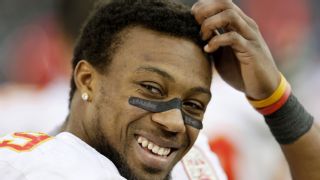
There had been no signs anything was amiss with Berry until the Oakland game. Like all Chiefs players, Berry underwent a full physical in June, which included routine blood work, and all tests came back normal.
Berry worked with Chiefs trainer Rick Burkholder several times in the subsequent months. During training camp, Berry dealt with a dislocated finger as well as heel and ankle injuries and did not play a preseason snap. In Week 2 at Denver, he suffered a high ankle sprain and missed the next five games.
"I've obviously been with him a lot this season, and he didn't complain about anything until at the [Oakland] game," Burkholder told reporters in November after Berry received a tentative diagnosis.
That's how Berry is.
He's the heart and soul of the Chiefs, their defensive leader and speech-giver. He rarely complains. Teammates say he's upbeat, positive and encouraging. He has friends in all corners of the locker room. Some guys hang out with their position groups, but Berry considers the entire roster to be his group. Offense. Defense. Special teams.
"Eric is a passionate guy that I think creates a common thread within a locker room that keeps everybody on the same page, no matter if you're from California, Florida, Texas, black, white, Christian, Muslim," punter Dustin Colquitt said. "He accepts everybody for who they are if they can help out."
Berry was like that at the University of Tennessee, too. A native of Fairburn, Georgia, Berry started for the Volunteers as a true freshman. He also ingratiated himself with Dan Williams, then a redshirt sophomore defensive lineman from Memphis, and Colquitt's younger brother, Britton, who is also a punter.
Williams had an open-door policy at his off-campus apartment. Freshmen at Tennessee are required to live in the dorms, and Williams knew it could be a drag. He told the freshmen they could come to his place, hang out, eat, watch TV or even sleep. Berry was such a frequent visitor that he became, as Williams said, "my little brother."
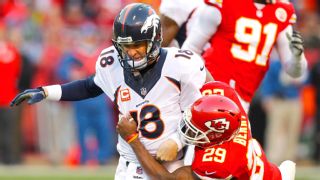
"When he first came in, he pretty much stood out from everybody," said Williams, now a nose tackle with the Arizona Cardinals.
Berry was a two-time unanimous All-American at Tennessee and won the Jim Thorpe Award as the nation's best defensive back in his junior year. He declared early for the draft, and the Chiefs selected Berry No. 5 overall in the 2010 draft.
Berry immediately stepped in as a starter at safety. After leading the Chiefs with four interceptions as a rookie, he made his first Pro Bowl. He went on to play in two more Pro Bowls, including last season when he became the first Chiefs safety to be named an All-Pro since Deron Cherry in 1988.
"He's one of the hardest working guys," Chiefs defensive coordinator Bob Sutton said. "He loves to practice, and anytime when your best players like to practice, that makes everything else easy, because they don't have to say anything. People look and say, 'OK, that's how it's going to be.'
"That's one of the things when I first came here [in 2013], I said, 'This guy runs to the ball every play and chases down the field 30 yards,' and he's just that kind of guy. So you know he's a driven guy, highly motivated, and I think all that, you can't quantify it, but you know that there's something that he brings to our team that's really important."
Something the Chiefs learned they had lost the morning of Nov. 24.
• • •The Chiefs' charter touched down in Kansas City in the early morning hours of Nov. 21 following their 24-20 loss to the Raiders, which ended a five-game winning streak.
Berry had just started to find his peak form after missing five games, Sutton said. Now, Berry was experiencing a weird feeling in his chest.
That Friday afternoon, Berry had an X-ray of his chest that didn't show anything unusual, but when Burkholder and the team's orthopedic physician, Cris Barnthouse, examined him, things didn't add up. Berry experienced pain when he moved his arm but was not sensitive to touch, nor was his strength affected. If he had bruised his chest, he would have experienced pain in all three cases.
Barnthouse recommended Berry get an MRI. Berry looked at Burkholder, who said, "Let's knock this out to be sure." But no one suspected cancer would be discovered.
Berry got the MRI late in the afternoon and was gone by the time the results came back. Barnthouse called Burkholder and told him there was a mass in Berry's chest. Barnthouse suspected it was lymphoma, and Burkholder waited to tell Berry the news in person.
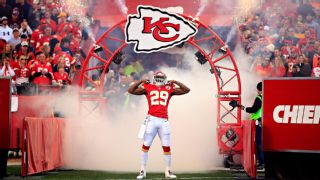
At 7 a.m. Saturday, Burkholder met Berry in the training room at the Chiefs complex and explained the situation to him. Then Berry went for more tests at the University of Kansas Cancer Center.
When those tests came back positive, Burkholder asked Barnthouse and team internist Mike Monaco to come to the Chiefs facility. Burkholder then explained to Berry that Hodgkin lymphoma is treatable and what he needed to do. Berry was stoic and worried about his mother, and he asked Burkholder if he could play the next week against Denver. Chiefs head coach Andy Reid met with Berry after that.
"You've got some good things going for you," Reid told Berry. "You're strong and healthy. You'll get the right doctor and get the best care. Let's go. Let's not waste any time."
Berry replied: "Let's go."
"I think we were all shocked," Reid said. "There's part of you that you're so glad they found it. There's another part that just goes, 'Wow.' It just catches you. Whoa. And then your next part is finding a way to take care of it, so it's a bang-bang kind of process.
"[Berry] was all on board with it. That wasn't something that needed to be told."
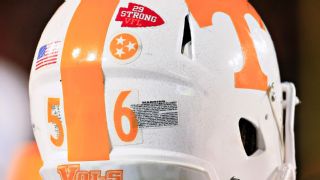
Asked if Berry felt sorry for himself, Reid said, "That's not the way he's wired at all. He's completely the opposite of that. He said, 'Let's figure it out, figure out what I've got, go through the tests and get busy on it.' He is very matter-of-fact that way."
On Sunday, Reid told Sutton the news. Like everyone else, Sutton was shocked.
The next day, members of the Chiefs' leadership council arrived to find a note that they needed to meet at 8:05 a.m. When the handful of veteran players walked into a conference room, Berry was there with his uncle. They took seats around the table, and Berry told them he had a lump in his chest and that doctors were hopeful it was Hodgkin lymphoma. If it was, the odds were in his favor.
"With 29, the way he is, percentages don't really matter to him," Colquitt said, referring to Berry's uniform number. "He's like one of those high-motor, 110-percent kind of guys. They don't apply to him."
Reid had left it to Berry to decide who would break the news to the team. Reid said he would do it if Berry could not, but Berry decided it would be best if the team heard it from him directly.
Telling the leadership council, which includes quarterback Alex Smith, running back Jamaal Charles and linebacker Houston, was the first step.
"I was just completely taken aback," Smith said. "I had absolutely no idea."
A few minutes later, the entire team assembled, expecting to hear about the following week's opponent, the Denver Broncos. Reid said Berry had something to tell them. Berry spoke for less than a minute, but his message was upbeat, positive and real.
This is the next opponent I have to face. I'm going to beat it. You guys have an opponent. I wish I could be there, but you guys fight.
Indianapolis coach Chuck Pagano got a text later that morning. It was from Reid, who was asking a favor.
Pagano had coached Berry in the Pro Bowl in January 2014. Every day leading up to the game, the two sat beside each other on the bus to and from practice. Pagano said he had known Berry from afar and had "great respect for the way he played the game," but on those bus rides, they got to know each other.
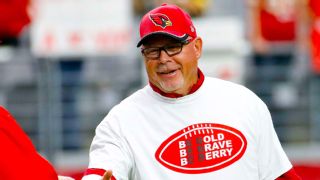
Reid asked Pagano, who battled leukemia in 2012 and has been cancer free for two years, to talk to Berry.
When Pagano called Berry later that week, Berry was in Atlanta at Emory University's Winship Cancer Institute about to undergo tests that would later confirm his diagnosis. Pagano told Berry what he could expect from chemotherapy, how his taste buds and appetite would be affected, how he might experience nausea and how his hair eventually would fall out.
Pagano also told Berry how football and family got him through the long days of chemo. Pagano was hospitalized for 26 days. He arranged his room like a home, with pictures of family and friends. He had a monitor brought in, along with his laptop and iPad. When he felt up to it, he watched practice and game film.
"There are going to be times when you're going to feel like doing nothing but sleeping," Pagano told Berry. "But there will be times you'll want football. Break down tape. Do something. It makes those days go by a little faster."
"I think football was the greatest medicine for Chuck," said Arizona coach Bruce Arians, who was the Colts' offensive coordinator and interim coach during Pagano's absence in 2012. "We kept him so involved in the daily process, and I think it drove him to get back. I think the same thing with Eric. You can think about the hand you're dealt, but then you also have the thing you love a lot."
Pagano said he was "honored and humbled" that Reid asked him to call Berry. He sent Berry his book, "Sidelined: Overcoming Odds through Unity, Passion and Perseverance," and later called him again.
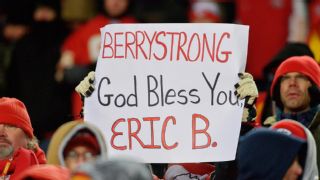
"He was great," Pagano said of Berry. "He was upbeat, positive, and he'd already had his mind made up what the outcome was going to be. That's so important for anybody who's going to face any type of illness, some form of cancer or anything -- attitude and mindset. His was already made up. He's young. He's athletic. He's healthy. But he knew right from the get-go that he was going to defeat this thing."
Dr. Christopher R. Flowers, the director of Emory's lymphoma program who diagnosed Berry, said in a statement that the condition was "very treatable and potentially curable." Berry has released two statements but is not yet ready to speak to the media, a team spokesman said.
Reid is making sure Berry stays connected to the franchise. Some inside the Chiefs organization suspected Berry had felt isolated from the team in 2011, when he tore his ACL in Week 1 and spent the rest of the season rehabbing. They want him to feel the team's support while undergoing treatment in Atlanta, where he has the support of his parents and family.
That's why, when Berry is ready, owner Clark Hunt plans to fly to Atlanta to visit. Same with Reid, Burkholder, general manager John Dorsey, Chiefs president Mark Donovan and Ted Crews, the team's vice president of communications. One by one, they will go see Berry, and when they can, they'll take players to visit, too. The plan is in place.
Berry also has support from around the NFL. After several Chiefs players designed T-shirts that said, "Be Strong. Be Brave. Be Berry," the Cardinals called and asked for 20. Arians and several players wore them before facing Kansas City in Week 14. Denver quarterback Peyton Manning reached out to Berry. Broncos coach John Fox called Reid. All wondered how they could help.
Berry recently started treatment. He has several long months ahead of him, but the Chiefs are optimistic he will beat cancer and eventually rejoin the team.
"I think he's in the right frame of mind where he just wants to attack it and get on with it," Reid said.
Chiefs doctors likely would have discovered the mass in Berry's chest at some point even without treatment after the hit in Oakland. But that is not a certainty, and the injury very possibly accelerated Berry's diagnosis.
Said Abdullah: "Our collision is kind of what sparked him going to get treatment and eventually them finding the cancer, so in many ways it was a blessing."
It was a play that changed everything.

